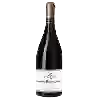
Winery Benoit TassyCorton Grand Cru
This wine generally goes well with poultry, beef or veal.
Food and wine pairings with Corton Grand Cru
Pairings that work perfectly with Corton Grand Cru
Original food and wine pairings with Corton Grand Cru
The Corton Grand Cru of Winery Benoit Tassy matches generally quite well with dishes of beef, veal or game (deer, venison) such as recipes of quick beef bourguignon, veal chop with mushrooms or wild boar with honey.
Details and technical informations about Winery Benoit Tassy's Corton Grand Cru.
Discover the grape variety: Pinot noir
Pinot noir is an important red grape variety in Burgundy and Champagne, and its reputation is well known! Great wines such as the Domaine de la Romanée Conti elaborate their wines from this famous grape variety, and make it a great variety. When properly vinified, pinot noit produces red wines of great finesse, with a wide range of aromas depending on its advancement (fruit, undergrowth, leather). it is also the only red grape variety authorized in Alsace. Pinot Noir is not easily cultivated beyond our borders, although it has enjoyed some success in Oregon, the United States, Australia and New Zealand.
Informations about the Winery Benoit Tassy
The Winery Benoit Tassy is one of of the world's greatest estates. It offers 10 wines for sale in the of Corton Grand Cru to come and discover on site or to buy online.
The wine region of Corton Grand Cru
The wine region of Corton Grand Cru is located in the region of Côte de Beaune of Burgundy of France. Wineries and vineyards like the Domaine de La Romanée-Conti or the Domaine Méo-Camuzet produce mainly wines red, white and sweet. The most planted grape varieties in the region of Corton Grand Cru are Pinot noir, Chardonnay and Cabernet-Sauvignon, they are then used in wines in blends or as a single variety. On the nose of Corton Grand Cru often reveals types of flavors of cherry, caramel or nutmeg and sometimes also flavors of clove, tar or dark fruit.
The wine region of Burgundy
Bourgogne is the catch-all regional appellation title of the Burgundy wine region in eastern France ("Bourgogne" is the French name for Burgundy). Burgundy has a Complex and comprehensive appellation system; counting Premier Cru and Grand Cru titles, the region has over 700 appellation titles for its wines. Thus, Burgundy wines often come from one Vineyard (or several separate vineyards) without an appellation title specific to the region, Village or even vineyard. A standard Burgundy wine may be made from grapes grown in one or more of Burgundy's 300 communes.
The word of the wine: Late harvest
A name historically used in Alsace, late harvest refers to grapes harvested during over-ripening for the production of sweet and syrupy wines.












